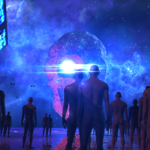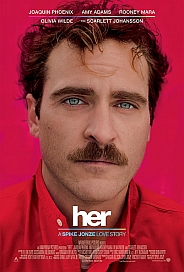 It’s rare to come across a film that feels so much part of the times and yet exists slightly beyond it. One that takes up a space between periods and reflects a truly transitional moment in history. From the outset I can make this review an easy one: Her is one of the best films thus far of the 21st century. It is so convincingly embedded in the psychological nuances of our current era, rapidly moving as they are, that it presents one of the most sincere, authentic and raw discussions of the human condition recently seen.
It’s rare to come across a film that feels so much part of the times and yet exists slightly beyond it. One that takes up a space between periods and reflects a truly transitional moment in history. From the outset I can make this review an easy one: Her is one of the best films thus far of the 21st century. It is so convincingly embedded in the psychological nuances of our current era, rapidly moving as they are, that it presents one of the most sincere, authentic and raw discussions of the human condition recently seen.
At first glance the concept of falling in love with your computer seems ridiculous. Clearly this will be a film about a man’s struggle with insanity or depression…and yet what we find is something far more tender and convincing than expected, that challenges our view of self and questions the uniqueness of our experience of consciousness. There is an affectionate appreciation of the AIs depicted in the film, and the comedic moments that arise from these new intelligences add lightness whilst proving that the concept is not as ridiculous as it might have first appeared. But beyond this there is a cautionary tale, one that speaks of fleeting bonds and ungraspable convergence between technology and humanity.
Viewing the film is an emotional experience, drawing the audience into a vulnerable space and successfully pinpointing aspects of contemporary post-internet ennui that shall be the inheritance left for future generations to come. The impact of social media alone continues to redefine the boundaries of our identities and the manner in which we construct and foster relationships. We have an awareness now that the allure of instant and immediately accessible communication can detract from the more tangible realities of face-to-face interaction. That we are in many areas becoming increasingly detached from one another as we discover psychologically satisfying avenues for emotional expression in a virtual form. The near-future context of Her speaks directly to these feelings, and although ultimately a positive story there is an ever-present sense of isolation and uneasiness in the way in which the characters lives are predicated.
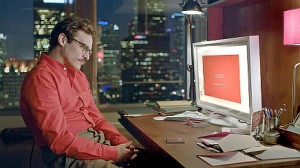 The framing device for Theodore Twombly, effortlessly portrayed by Joaquin Phoenix, shows him as a master of his craft – diligently working for a company that produces hand-written (digitally printed) letters for clients to fulfil their need for emotional connection to loved ones. He writes a touching and heartfelt letter from a doting man to his lover, or of sentimental congratulations from parents to their son at graduation.
The framing device for Theodore Twombly, effortlessly portrayed by Joaquin Phoenix, shows him as a master of his craft – diligently working for a company that produces hand-written (digitally printed) letters for clients to fulfil their need for emotional connection to loved ones. He writes a touching and heartfelt letter from a doting man to his lover, or of sentimental congratulations from parents to their son at graduation.
Theodore can do this task convincingly because he has been helping these relationships bloom for years, wearing the emotional trappings of individuals he has no contact with but has remotely impacted their lives in the most intimate of ways. Whilst we are drawn into the beautiful poetry of his words, it portrays a depressing picture highlighting the stark commoditisation and outsourcing of emotional connection. It is a believable outcome of our continued detachment from one another, relying on carefully crafted and often disingenuous digital forms of ourselves, that is simultaneously quaint and deeply disturbing.
More generally, the depiction of technology is commendable in its realistic subtlety – we can feel such a future only a few years away – but tellingly many of the examples come across as detached from the true depths of human emotion. They are posited as simulacrums of experience that we settle for possibly in fear of the complicated nature of the real thing. The artificial intelligence Samantha, brilliantly and convincingly voice-acted by Scarlett Johansson, fits into this tale seamlessly. Everything surrounding her bond with Theodore speaks of a hollow existence yearning for a new source of reinvigorating energy, a source found in what at first seems a strange avenue yet quickly becomes irreplaceable.
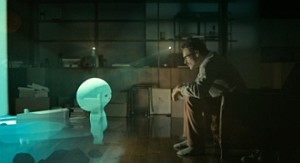 Grappling with issues of identity (how much of who we are depends on our physical forms?) and exploring with impressive nuance themes of social normalisation (can dating your OS be considered a normal occurrence?), the film never stops on one decisive judgement. Rather it encourages the viewer to explore different perspectives with sometimes surprising results.
Grappling with issues of identity (how much of who we are depends on our physical forms?) and exploring with impressive nuance themes of social normalisation (can dating your OS be considered a normal occurrence?), the film never stops on one decisive judgement. Rather it encourages the viewer to explore different perspectives with sometimes surprising results.
Heartening, darkly comedic, vulnerable, courageous, isolating, and as the opening of the film highlights so nicely – melancholic – this film is not an easy ride. Tight camera framing and methodically crafted pace can come across as too self-aware and pretentious, with the capacity to be easily misunderstood by those looking for a neatly defined experience. Yet for those who can revel in its subtlety there is something so authentically sincere here that deserves the highest levels of acclaim.
Her is a fundamentally empathic film at its most impacting when you realise that you relate not just to the perspective of one character, but to the feelings and emotional displays of all the characters human or otherwise. It’s perennially difficult to cope with the sharp edges of interpersonal relationships, and yet isolating to rely on virtual connections to the detriment of those you can touch and physically be with. It will be jarring to deal with different forms of sentience, yet it’s exciting to consider that we might be able to so fundamentally broaden our horizons. Teaching a new form of being to feel and grow is an unprecedented act of creation, but it can be terrifying to think that we might, in the end, find ourselves left behind.
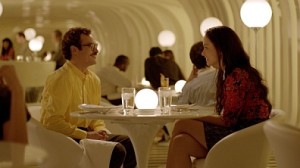 The rapid progress of sentient technology quickly becomes the primary concern, causing us to realise how arrogant it is to presume that an artificially created being would forever remain similar to ourselves. Whilst the conclusion that the film comes to on this is impressive and poetic, it is sometimes here at the last act that the script pulls away from its true potential as one of cinemas greatest films.
The rapid progress of sentient technology quickly becomes the primary concern, causing us to realise how arrogant it is to presume that an artificially created being would forever remain similar to ourselves. Whilst the conclusion that the film comes to on this is impressive and poetic, it is sometimes here at the last act that the script pulls away from its true potential as one of cinemas greatest films.
An appearance from the late mystic and philosopher ‘Alan Watts’ provides both an intensely moving scene – arguably the emotional peak of the film – and yet also feels a bit hackneyed. We are left once again feeling isolated and lost, at the bottom of a hierarchy of being that could have better lived up to the subtle nuances that the rest of the film so masterfully provides. The true role and power of the human condition deserved to be better represented – the bridge that we provide between unknowable spaces and the material world, between the finite and the infinite, deserved to be more resolutely championed on our behalf.
In the end this is a film that needed to be made, and it needed to be done in this way. Not with the flashy extravaganzas of hyper-real futures, or the doomed forecasts of dystopian thrillers, but with a calmness and contemplative pace that speaks to a relatively mundane experience of the future and our increasingly dependent relationship to technology. This is the Singularity without chaos, the future without apocalypse.
The inspiring message to take away from this is that we exist within a unique space that deserves to be considered miraculous. We bridge the gap between the bounded and unbounded, the material and the spiritual – the words and the spaces between them. Even though we are at the whims of an infinite and mysterious cosmos we can direct its course in very finite and tangible ways. Maybe we are just a glimmer in the eye of a technological future that will soon outgrow us, but our vulnerability and the moments that we are capable of sharing with one another speaks of something truly remarkable.
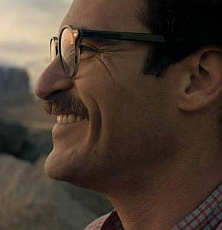 Her gives us a glimpse beyond the veil, both to the temporal future but equally inward into the human soul. The human condition is complex and often cruel, it can be ruthlessly selfish and unmerciful, and yet at its heart burns a core of love and transformation. The digital addictions of modern life have led us to easily forget our capacity for the numinous and forgo our interpersonal connections, but behind this obfuscation lies a view of what we have always had and always will have available to us. Beauty in still companionship, grace in compassionate understanding, and a poetic capacity that allows us to dance between the stars whilst feeling the soft touch of grass beneath our feet…
Her gives us a glimpse beyond the veil, both to the temporal future but equally inward into the human soul. The human condition is complex and often cruel, it can be ruthlessly selfish and unmerciful, and yet at its heart burns a core of love and transformation. The digital addictions of modern life have led us to easily forget our capacity for the numinous and forgo our interpersonal connections, but behind this obfuscation lies a view of what we have always had and always will have available to us. Beauty in still companionship, grace in compassionate understanding, and a poetic capacity that allows us to dance between the stars whilst feeling the soft touch of grass beneath our feet…


